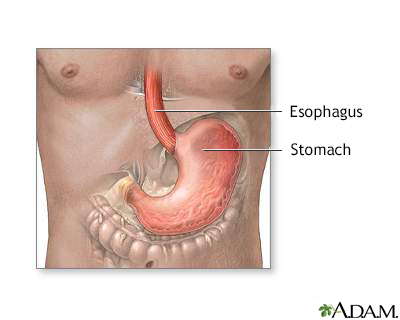Gastritis
Gastritis occurs when the lining of the stomach becomes inflamed or swollen.
Gastritis may last for only a short time (acute gastritis) or it may linger for months to years (chronic gastritis).
Images


I Would Like to Learn About:
Causes
The most common causes of gastritis are:
- Certain medicines, such as aspirin, ibuprofen, or naproxen and other similar drugs
- Heavy alcohol drinking
- Infection of the stomach with a bacteria called Helicobacter pylori
Less common causes are:
- Autoimmune disorders (such as pernicious anemia)
- Backflow of bile into the stomach (bile reflux)
- Cocaine use
- Eating or drinking caustic or corrosive substances (such as poisons)
- Extreme stress
- Viral infection, such as cytomegalovirus and herpes simplex virus (more often occurs in people with a weak immune system)
Trauma or a severe, sudden illness such as major surgery, kidney failure, or being placed on a breathing machine may cause gastritis.
Symptoms
Many people with gastritis do not have any symptoms.
Symptoms you may notice are:
- Loss of appetite
- Nausea and vomiting
- Pain in the upper part of the belly or abdomen
If gastritis is causing bleeding from the lining of the stomach, symptoms may include:
- Black stools
- Vomiting blood or coffee-ground-like material
Exams and Tests
Tests that may be needed are:
- Complete blood count (CBC) to check for anemia or low blood count
- Examination of the stomach with an endoscope (esophagogastroduodenoscopy or EGD) with biopsy of stomach lining
- H pylori tests (breath test or stool test)
- Stool test to check for small amounts of blood in the stools, which may be a sign of bleeding in the stomach
Treatment
Treatment depends on what is causing the problem. Some of the causes will go away over time.
You may need to stop taking aspirin, ibuprofen, naproxen, or other medicines that may be causing gastritis. Always talk to your health care provider before stopping any medicine.
You may use other over-the-counter and prescription drugs that decrease the amount of acid in the stomach, such as:
- Antacids
- H2 antagonists: famotidine (Pepcid), cimetidine (Tagamet), and nizatidine (Axid)
- Proton pump inhibitors (PPIs): omeprazole (Prilosec), esomeprazole (Nexium), Iansoprazole (Prevacid), rabeprazole (AcipHex), and pantoprazole (Protonix)
Antibiotics may be used to treat gastritis caused by infection with Helicobacter pylori bacteria.
Outlook (Prognosis)
The outlook depends on the cause, but is often very good.
Possible Complications
Blood loss and increased risk for gastric cancer can occur.
When to Contact a Medical Professional
Contact your provider if you develop:
- Pain in the upper part of the belly or abdomen that does not go away
- Black or tarry stools
- Vomiting blood or coffee-ground-like material
Prevention
Avoid long-term use of substances that can irritate your stomach such as aspirin, anti-inflammatory drugs, or alcohol.
Related Information
BileAutoimmune disorders
Taking antacids
References
Feldman M, Jensen PJ, Howden CW. Gastritis and gastropathy. In: Feldman M, Friedman LS, Brandt LJ, eds. Sleisenger and Fordtran's Gastrointestinal and Liver Disease. 11th ed. Philadelphia, PA: Elsevier; 2021:chap 52.
Kuipers EJ. Acid peptic disease. In: Goldman L, Schafer AI, eds. Goldman-Cecil Medicine. 26th ed. Philadelphia, PA: Elsevier; 2020:chap 130.
BACK TO TOPReview Date: 1/30/2023
Reviewed By: Michael M. Phillips, MD, Emeritus Professor of Medicine, The George Washington University School of Medicine, Washington, DC. Also reviewed by David C. Dugdale, MD, Medical Director, Brenda Conaway, Editorial Director, and the A.D.A.M. Editorial team.

Health Content Provider
06/01/2025
|
A.D.A.M., Inc. is accredited by URAC, for Health Content Provider (www.urac.org). URAC's accreditation program is an independent audit to verify that A.D.A.M. follows rigorous standards of quality and accountability. A.D.A.M. is among the first to achieve this important distinction for online health information and services. Learn more about A.D.A.M.'s editorial policy, editorial process and privacy policy. A.D.A.M. is also a founding member of Hi-Ethics. This site complied with the HONcode standard for trustworthy health information from 1995 to 2022, after which HON (Health On the Net, a not-for-profit organization that promoted transparent and reliable health information online) was discontinued. |
The information provided herein should not be used during any medical emergency or for the diagnosis or treatment of any medical condition. A licensed medical professional should be consulted for diagnosis and treatment of any and all medical conditions. Links to other sites are provided for information only -- they do not constitute endorsements of those other sites. © 1997- 2024 A.D.A.M., a business unit of Ebix, Inc. Any duplication or distribution of the information contained herein is strictly prohibited.
